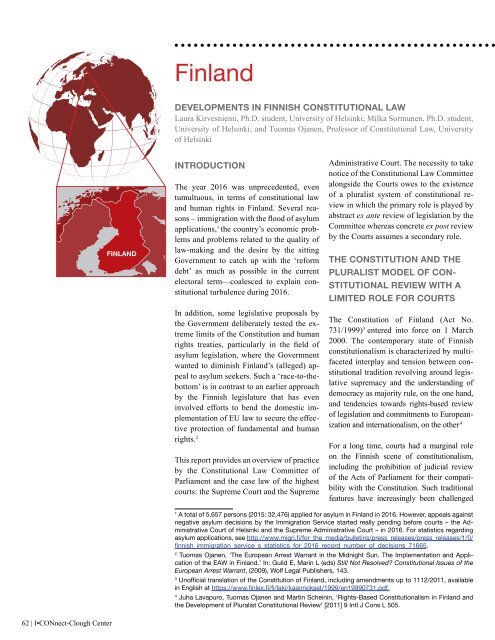2016 Global Review of Constitutional Law
I-CONnect–Clough Center collaboration.
I-CONnect–Clough Center collaboration.
Create successful ePaper yourself
Turn your PDF publications into a flip-book with our unique Google optimized e-Paper software.
Finland<br />
DEVELOPMENTS IN FINNISH CONSTITUTIONAL LAW<br />
Laura Kirvesniemi, Ph.D. student, University <strong>of</strong> Helsinki; Milka Sormunen, Ph.D. student,<br />
University <strong>of</strong> Helsinki; and Tuomas Ojanen, Pr<strong>of</strong>essor <strong>of</strong> <strong>Constitutional</strong> <strong>Law</strong>, University<br />
<strong>of</strong> Helsinki<br />
FINLAND<br />
INTRODUCTION<br />
The year <strong>2016</strong> was unprecedented, even<br />
tumultuous, in terms <strong>of</strong> constitutional law<br />
and human rights in Finland. Several reasons<br />
– immigration with the flood <strong>of</strong> asylum<br />
applications, 1 the country’s economic problems<br />
and problems related to the quality <strong>of</strong><br />
law-making and the desire by the sitting<br />
Government to catch up with the ‘reform<br />
debt’ as much as possible in the current<br />
electoral term—coalesced to explain constitutional<br />
turbulence during <strong>2016</strong>.<br />
In addition, some legislative proposals by<br />
the Government deliberately tested the extreme<br />
limits <strong>of</strong> the Constitution and human<br />
rights treaties, particularly in the field <strong>of</strong><br />
asylum legislation, where the Government<br />
wanted to diminish Finland’s (alleged) appeal<br />
to asylum seekers. Such a ‘race-to-thebottom’<br />
is in contrast to an earlier approach<br />
by the Finnish legislature that has even<br />
involved efforts to bend the domestic implementation<br />
<strong>of</strong> EU law to secure the effective<br />
protection <strong>of</strong> fundamental and human<br />
rights. 2<br />
This report provides an overview <strong>of</strong> practice<br />
by the <strong>Constitutional</strong> <strong>Law</strong> Committee <strong>of</strong><br />
Parliament and the case law <strong>of</strong> the highest<br />
courts: the Supreme Court and the Supreme<br />
Administrative Court. The necessity to take<br />
notice <strong>of</strong> the <strong>Constitutional</strong> <strong>Law</strong> Committee<br />
alongside the Courts owes to the existence<br />
<strong>of</strong> a pluralist system <strong>of</strong> constitutional review<br />
in which the primary role is played by<br />
abstract ex ante review <strong>of</strong> legislation by the<br />
Committee whereas concrete ex post review<br />
by the Courts assumes a secondary role.<br />
THE CONSTITUTION AND THE<br />
PLURALIST MODEL OF CON-<br />
STITUTIONAL REVIEW WITH A<br />
LIMITED ROLE FOR COURTS<br />
The Constitution <strong>of</strong> Finland (Act No.<br />
731/1999) 3 entered into force on 1 March<br />
2000. The contemporary state <strong>of</strong> Finnish<br />
constitutionalism is characterized by multifaceted<br />
interplay and tension between constitutional<br />
tradition revolving around legislative<br />
supremacy and the understanding <strong>of</strong><br />
democracy as majority rule, on the one hand,<br />
and tendencies towards rights-based review<br />
<strong>of</strong> legislation and commitments to Europeanization<br />
and internationalism, on the other .4<br />
For a long time, courts had a marginal role<br />
on the Finnish scene <strong>of</strong> constitutionalism,<br />
including the prohibition <strong>of</strong> judicial review<br />
<strong>of</strong> the Acts <strong>of</strong> Parliament for their compatibility<br />
with the Constitution. Such traditional<br />
features have increasingly been challenged<br />
1<br />
A total <strong>of</strong> 5,657 persons (2015: 32,476) applied for asylum in Finland in <strong>2016</strong>. However, appeals against<br />
negative asylum decisions by the Immigration Service started really pending before courts – the Administrative<br />
Court <strong>of</strong> Helsinki and the Supreme Administrative Court – in <strong>2016</strong>. For statistics regarding<br />
asylum applications, see http://www.migri.fi/for_the_media/bulletins/press_releases/press_releases/1/0/<br />
finnish_immigration_service_s_statistics_for_<strong>2016</strong>_record_number_<strong>of</strong>_decisions_71665.<br />
2<br />
Tuomas Ojanen, ‘The European Arrest Warrant in the Midnight Sun. The Implementation and Application<br />
<strong>of</strong> the EAW in Finland.’ In: Guild E, Marin L (eds) Still Not Resolved? <strong>Constitutional</strong> Issues <strong>of</strong> the<br />
European Arrest Warrant, (2009), Wolf Legal Publishers, 143.<br />
3<br />
Un<strong>of</strong>ficial translation <strong>of</strong> the Constitution <strong>of</strong> Finland, including amendments up to 1112/2011, available<br />
in English at https://www.finlex.fi/fi/laki/kaannokset/1999/en19990731.pdf.<br />
4<br />
Juha Lavapuro, Tuomas Ojanen and Martin Scheinin, ‘Rights-Based <strong>Constitutional</strong>ism in Finland and<br />
the Development <strong>of</strong> Pluralist <strong>Constitutional</strong> <strong>Review</strong>’ [2011] 9 Intl J Cons L 505.<br />
62 | I•CONnect-Clough Center


